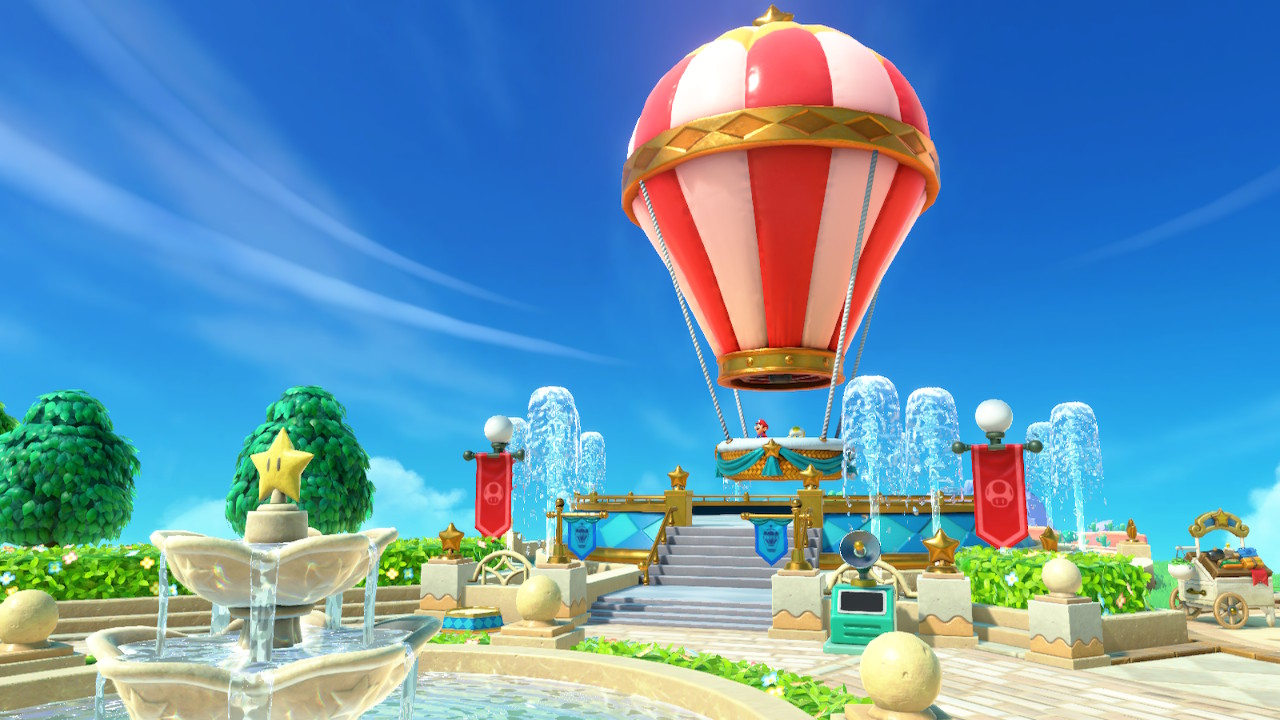TechRadar Verdict
Super Mario Party Jamboree doesn’t break new ground but takes the best of the series’ past and present to make a big celebratory package, best experienced at get-togethers where the real magic (and carnage) happens.
Pros
- +
A wealth of modes and minigames
- +
Approachable gameplay for all players
- +
Koopathlon is a novel online multiplayer mode
Cons
- -
Lackluster single-player campaign and other modes aren’t fun solo
- -
Having to unlock gameplay content in a party game is a chore
Why you can trust TechRadar
Platform reviewed: Nintendo Switch
Available on: Nintendo Switch
Release date: October 17, 2024
With the holidays fast approaching, you can’t really go wrong with a new Mario Party game as the best way to bring people together or drive each other crazy. Super Mario Party Jamboree is even more special as the third entry on the Nintendo Switch, which feels like a big blowout for both the series and the console, as it takes the best of everything to make it the Mario Party with the biggest and most varied amount of content for every type of player.
Motion controls are back for those who enjoyed them in Super Mario Party, though if you didn’t you can opt out as they only take up a small portion of the more than 110 minigames in Jamboree. There are even more options for online multiplayer, including two modes made exclusively for online play (or AI if matchmaking becomes an issue).
Minimayhem
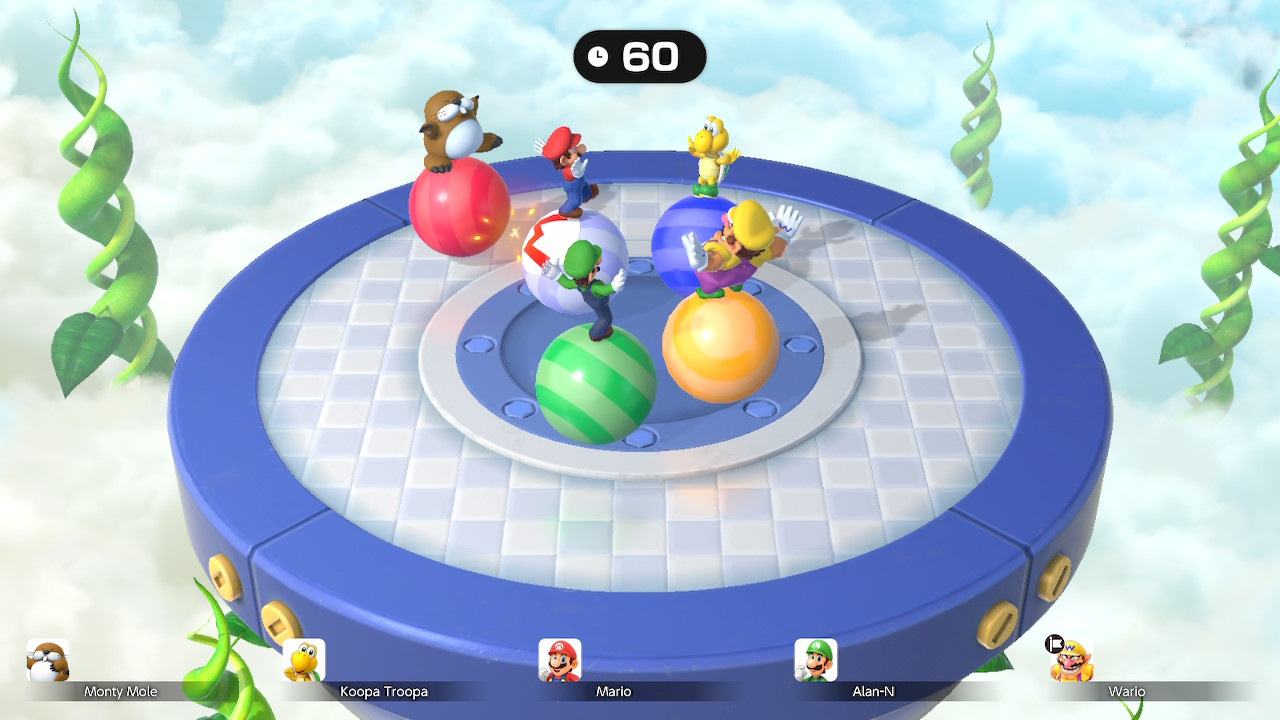
For newcomers, the Switch game Super Mario Party Jamboree is essentially an interactive board game where up to four players roll (or rather bump) dice to move across a range of lovingly designed Mario-themed boards, competing to win coins and in turn obtain stars to come out on top. That’s the civil description, as of course it also involves a lot of shenanigans with minigames where you’re actively screwing over your rivals to bag the most coins or having to work together in 2v2 or 3v1 minigames.
Those underhanded tactics, often based on luck, also play out on the board themselves, each with different mechanics and paths to take. For example, on Goomba Lagoon, the changing tide might find you stranded and going around in circles for a couple of turns, and while the star is always at the same location in Mario’s Rainbow Castle, you can flip the rules so that your rival has the misfortune of collecting a fake star instead. Nothing however is quite as evil as getting a Boo to steal stars for you.
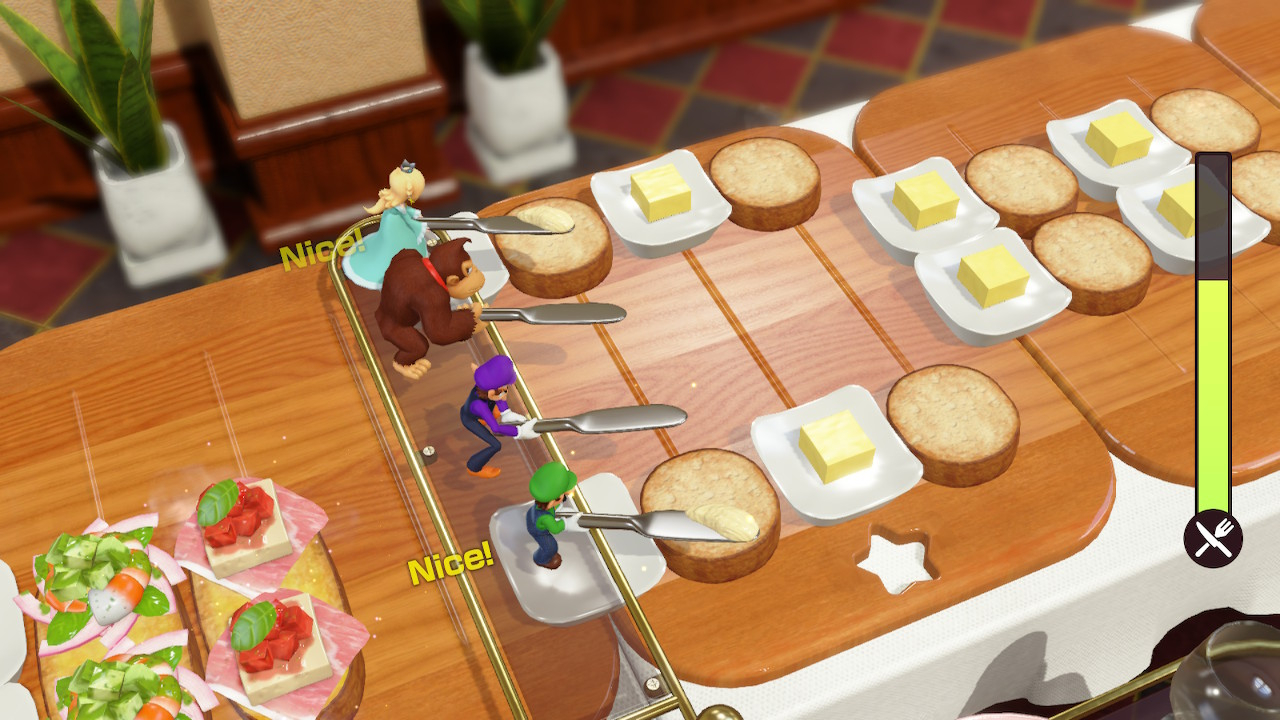
As a fan of rhythm games as well as being a bit of a foodie, I couldn’t help but instantly take to Rhythm Kitchen, which combines well-timed motion-controlled shaking with food-themed minigames. From spreading butter on bread slices to skewering meats and vegetables flying towards you, it’s all rather delightful. For those less motion-inclined, there’s also some mouthwateringly-rendered food in button-based minigames that can also be grouped together in Minigame Bay’s Daily Challenges.
This level of unpredictability is, much like the controversial blue shell in Mario Kart, Nintendo’s unique brand of leveling the playing field, so that no matter how good or bad you think you are at Mario Party, everyone’s got a chance to be a superstar. Even then, minigames, from the super-short item minigames to the gauntlets required to obtain an ally character who can also double your rewards, are simple and intuitive enough for players of all skill levels to understand, while by default you can practice as long as they like until everyone’s ready to play the minigame for real.
Suffice to say that much of what makes Mario Party work so well is being able to play together, so I found the board mechanics and watching everyone to have their turn tedious when just playing solo with AI players, even with the option to speed up some animations. Boards can be played online too, and there are some charming emotes you can use, which have also been designed so that trolls can’t spam them repeatedly, but even post-pandemic, it’s a poor substitute to being in the same room. If you are going to play online, then I can only recommend setting up a group with friends instead of random matchmaking and to also have your own separate voice chat group rather than the Switch Online app.
Don't play alone
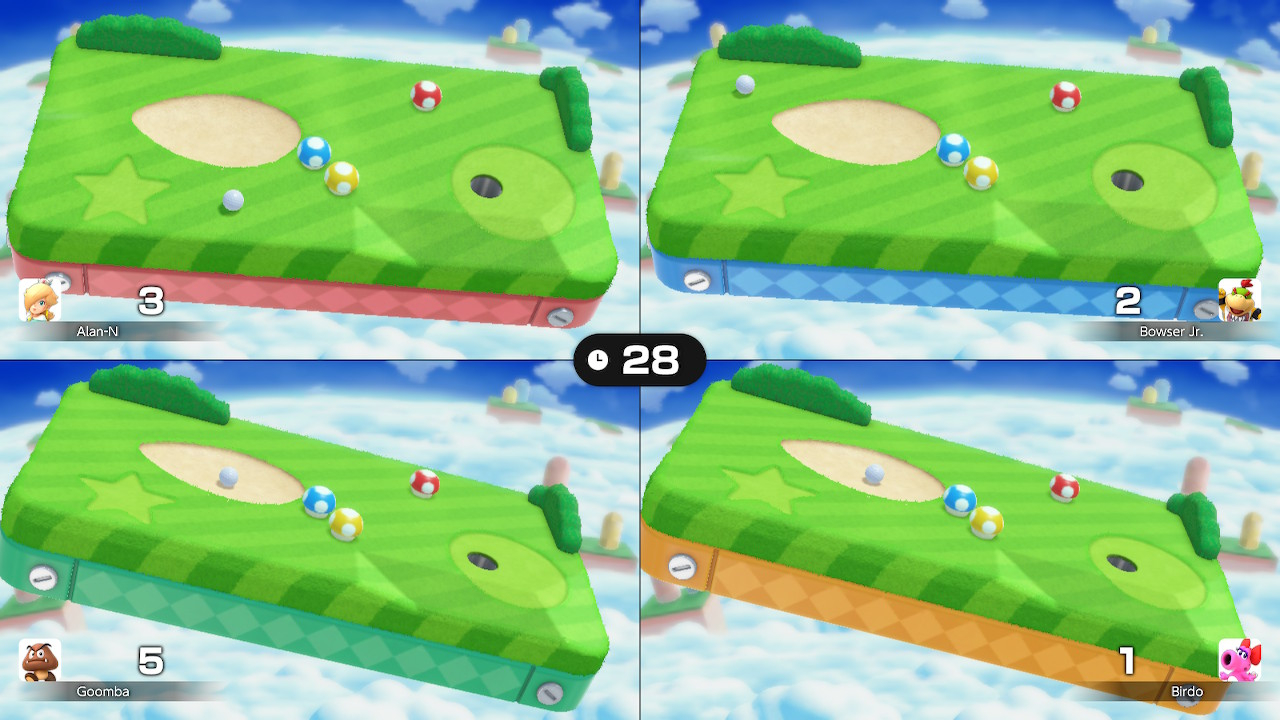
While the main attraction, boards are just one aspect of Super Mario Party Jamboree, as you can traverse this bountiful party resort, reminiscent of Wii Sports Resort’s Wuhu Island, and pick a range of other modes, while the Party Plaza hub also contains what you could call the game’s single-player campaign; Party-Planner Trek.
It’s the weakest element of the package, since playing Mario Party by yourself can feel like a drag outside of minigames. It’s all the more peculiar that it guts the boards of their inventive mechanics as you simply move across them freely while ticking off a series of mundane fetch quests to earn mini-stars. It may be a short campaign but I still resented playing this mode in order to rank up with achievements and unlock game content. Your mileage may vary with unlockables, but I found it frustrating that the game’s newest features, such as new playable characters Pauline and Ninji, require jumping through a bunch of hoops first.
Faring better is side content that cuts out the futz and focuses on minigames. Minigame Bay is the perfect pitstop for short burst sessions, whether you want to play whichever of the more than 110 minigames available or jump into the Daily Challenge, with a selection of minigames grouped into themes. I was however most taken by the bespoke motion-themed islands, such as Toad’s Item Factory, a series of puzzle challenges as players guide balls around to a goal using motion-controlled platforms and blocks, and which feels fun even when soloing.
For the times when getting people together is impossible, there are also online-specific modes. Compared to the stop-start of co-op-based Bowser Kaboomb Squad, the 20-player Koopathlon has a peculiar charm to it as you’re competing against other players but almost always in parallel. Each minigame you’re thrown into gives you the chance to collect as many coins, which in turn keeps your character moving along a racetrack that’s also visible to the right of the screen. It’s a refreshing mode in a post-Fall Guys world and one that may have the most staying power, given its also button-only minigames make it easy to jump into for a quick handheld session.
Accessibility
Super Mario Party Jamboree doesn’t have accessibility settings as such but you’ll have the option to toggle various settings before the start of any mode. These include adjusting difficulty, whether or not to start each minigame with a tutorial, or the option to turn off motion minigames. Note that there are no alternate button controls for motion minigames, which means modes such as Rhythm Kitchen will be inaccessible if you’re not able to play with the required control configuration.
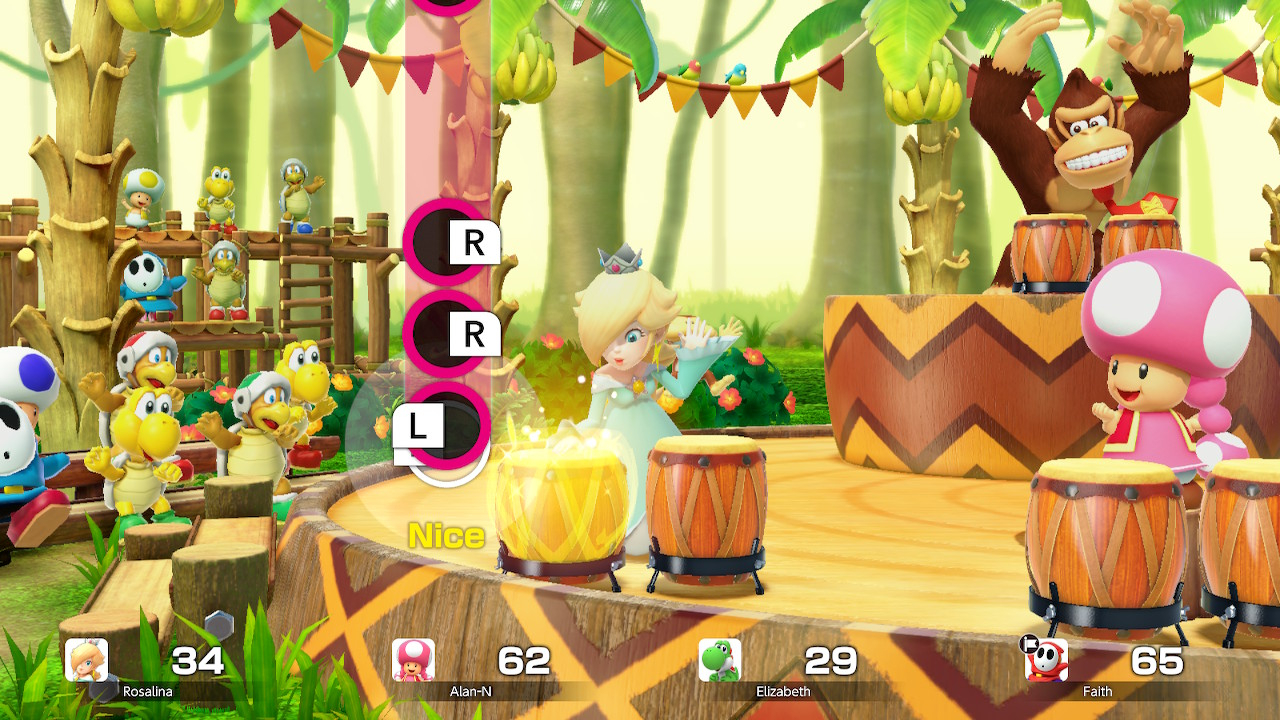
Should you play Super Mario Party Jamboree?
Play it if...
You love having people over for couch multiplayer
Getting up to four people together in front of the TV is the way Super Mario Party Jamboree is best experienced, providing all manner of charm, hilarity, and shenanigans that anyone can enjoy.
You’re after a varied party package
There’s not just a large selection of boards but other modes, including some dedicated to motion controls, that provide a good variety if you’re after a quick burst of fun.
Don't play it if...
You’re prefer single-player Mario adventures
The joy of Super Mario Party Jamboree comes from playing with others in the same room. While there are single-player and online options, they pale compared to good old couch multiplayer.
How I reviewed Super Mario Party
I played Super Mario Party Jamboree for more than 15 hours on my Nintendo Switch OLED, which included multiple local multiplayer sessions. I was able to complete the single-player campaign, unlock all the party boards, try every minigame, and unlock lots if not all cosmetic items. Nintendo didn’t host online play sessions during the review period, so my experience with the online modes was limited to playing with AI players.
I played primarily in docked mode on an LG C2 OLED TV and played with a single Joy-Con, which is the default configuration if you want to swap between button and motion minigames. I also spent some time playing in handheld mode, which didn’t impact visuals and performance but would mean I wouldn’t be able to access motion-based minigames.
Alan Wen is a freelance journalist writing about video games in the form of features, interview, previews, reviews and op-eds. His work has appeared in print including Edge, Official Playstation Magazine, GamesMaster, Games TM, Wireframe, Stuff, and online including Kotaku UK, TechRadar, FANDOM, Rock Paper Shotgun, Digital Spy, The Guardian, and The Telegraph.
